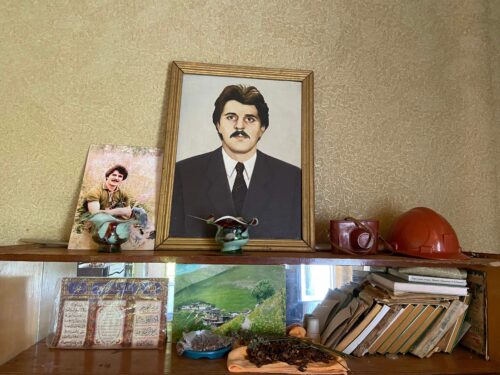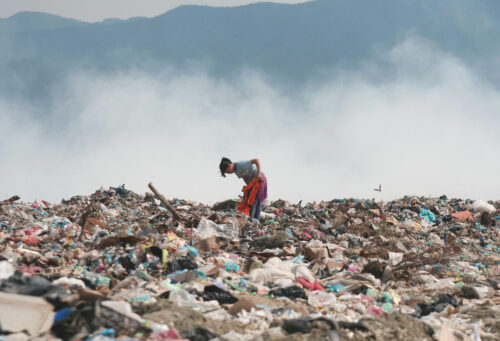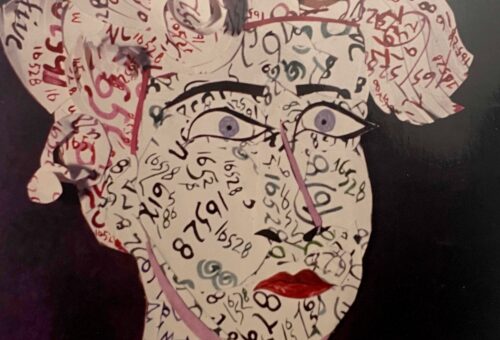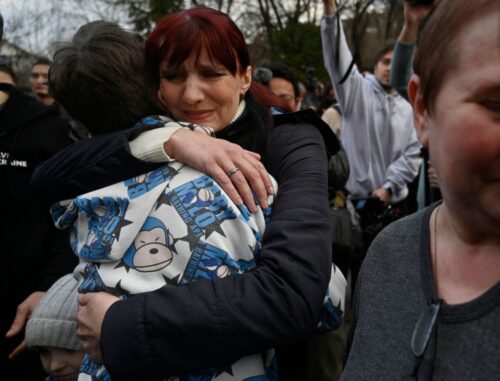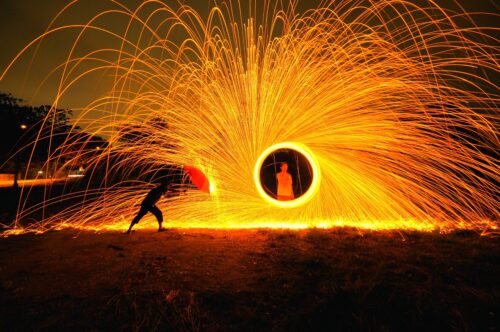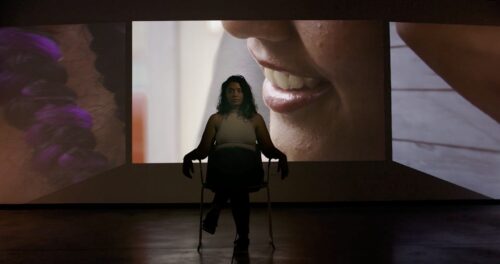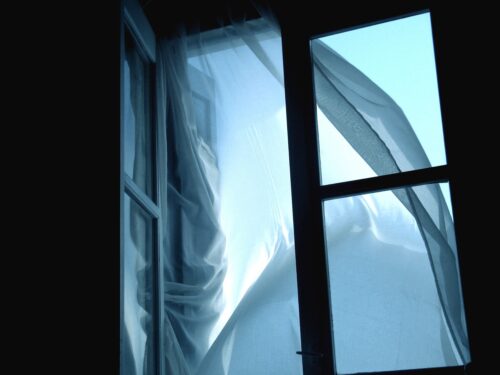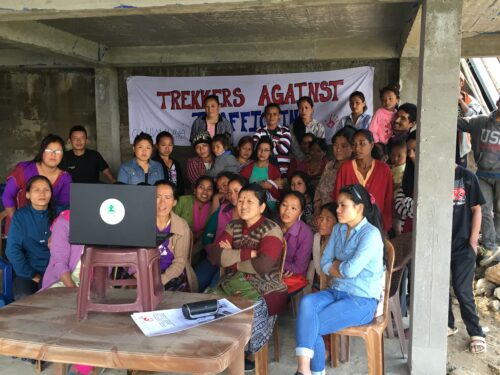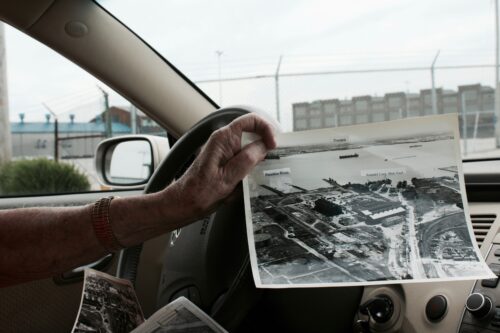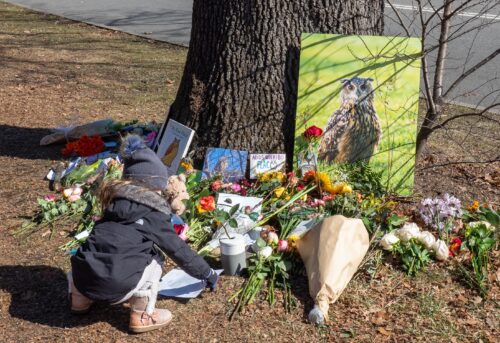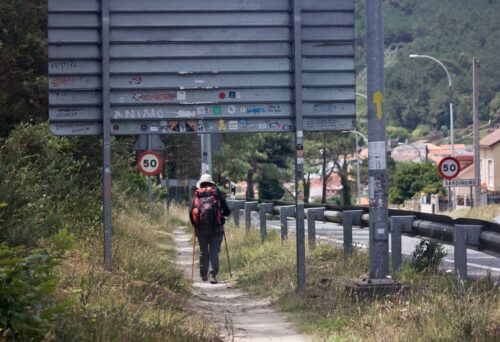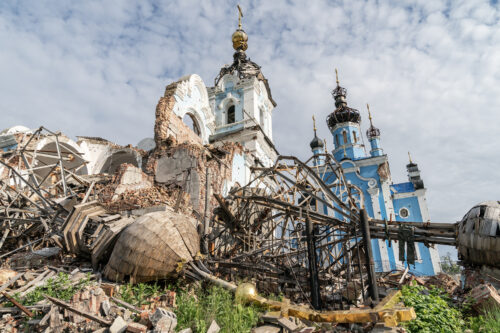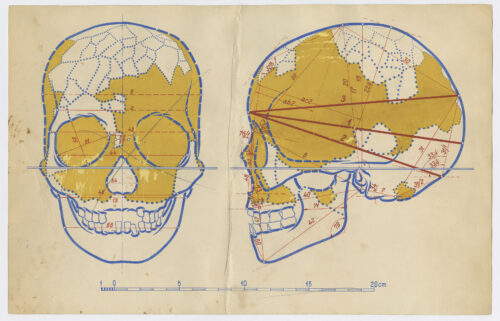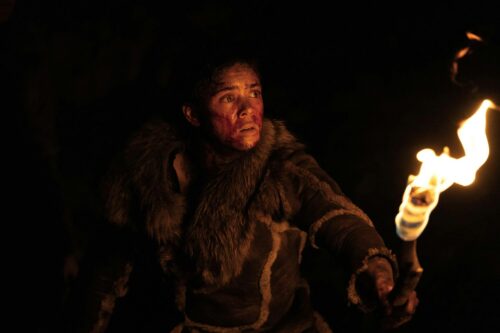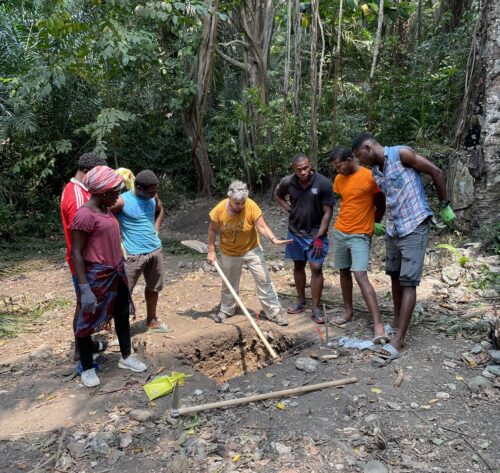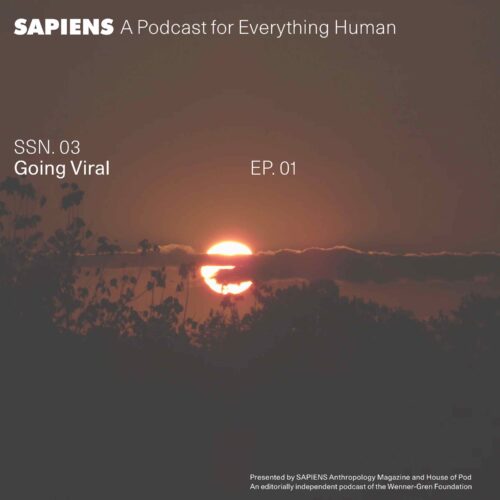With the arrival of the coronavirus pandemic, the SAPIENS podcast is going viral. In this first episode of season 3, SAPIENS hosts Chip Colwell and Jen Shannon revisit a story about preppers from our first season. Jen calls Chad Huddleston, one of the anthropologists featured on that show, to find out how he and the preppers he studies are handling the COVID-19 crisis. In closing, Chip reaches out to SAPIENS columnist and anthropologist Steve Nash to discuss panic buying, toilet paper, and more.
- Chad Huddleston is an adjunct assistant professor at St. Louis University and an instructor at Southern Illinois University, Edwardsville. Read his SAPIENS article: “For Preppers, the Apocalypse Is Just Another Disaster.”
- Steve Nash is a historian of science, an archaeologist at the Denver Museum of Nature & Science, and a columnist for SAPIENS. Check out his column Curiosities and follow him on Twitter @nash_dr.
Chip: Jen, how’s it going?
Jen: I’m good. I am sitting in an attic closet. You?
Chip: Not an attic, but I am in my daughter’s room with a huge audio face shield.
Jen: Oh, the things we do for good sound for the audience.
Chip: Yeah, that’s right, it’s all for you, dear listener. How are you doing, though? Are you navigating the crisis OK?
Jen: Yeah, I’m lucky. I’m working from home, so I’ve been adjusting to online teaching. How about you?
Chip: Yeah, I’m doing all right. I count myself fortunate to be healthy and to be able to work from home. It’s also been totally hectic and crazy, you know, these are really just strange, strange days. In one way that I’ve been really lucky is that as editor-in-chief of SAPIENS, I’m seeing this huge flood of articles being pitched to the magazine. Anthropologists really want to help people make sense of this moment, to make sense of the pandemic, where we’ve been, where we are now, and where we’re going. So that’s really why we wanted to translate a lot of these articles into a season 3, which is going to tackle the global pandemic through an anthropological lens.
Jen: Yeah, and I’m really excited to learn about all these new articles and talk about some of them. But I know you and I have been thinking a lot lately about an episode from our first season about TEOTWAWKI.
Chip: Yes, yes. “The end of the world as we know it.”
Jen: This is where we featured a story about an anthropologist who works with preppers. And we’ve been thinking a lot about that story these last few weeks and wondering how that community is adjusting to the current pandemic and crisis, and whether this is their idea of the end of the world and how they’re approaching it. So, for this episode, we’re going to replay that short piece, which picks up after a brief introduction about one of our producers’ experiences with some preppers in Colorado Springs. Then I’m going to have a chat with anthropologist Chad Huddleston about what he’s up to and what those preppers are doing right now.
[music]
Chad Huddleston: … and it really was just basic information: Do you have a flashlight with batteries? Do you know where that flashlight is if your electric goes out? Do you have some extra canned goods if your electric goes out and you can’t get to the grocery story? It was just very basic, basic things.
Jen: This is Chad Huddleston. He’s an adjunct assistant professor at St. Louis University, an instructor at Southern Illinois University, Edwardsville, and one of the world’s foremost experts on preppers.
Chad: That kind of showed me that these are not extremists running around in the woods, you know, kind of anti-government militia types that we’ve heard about since the 1980s. This is a very different thing.
Jen: After hearing about Paul’s trip to Colorado Springs, I really wanted to learn more about preppers and what makes them tick. I had heard about them from that National Geographic show a few years ago, Doomsday Preppers. It was about civil war, foreign occupation, terrorist attack, doomsday marauders, and total economic collapse—
Chad: That was everyone’s initial introduction to prepping, was this idea of, you know, these kind of extremist people who build bunkers out in the middle of nowhere and have hundreds of thousands of dollars or tens of thousands of dollars of gear and are waiting for the nuclear apocalypse to come. That kind of thing.
Jen: And back in 2008, that’s pretty much all Chad knew about preppers too.
Chad: I was actually driving on the highway back from work and I saw a kind of militarized looking vehicle. And, but it wasn’t, it clearly wasn’t military, so it had a symbol on the side, and I looked it up and then I found this whole world that I had never heard of, preppers.
Jen: Chad grew up in an outdoorsy family. He knew how to hunt and fish, so he was personally interested in some of the things these people were talking about. As he recently recalled in an article for SAPIENS.org, Chad attended the group’s next public meeting.
Chad: And there’s linoleum tables, lots of tattooed people, lots of Mohawks, lots of piercings, some kind of what we call tacticool clothing.
Jen: That’s tacticool, as in tactical—but cool. Think camo pants, heavy-duty boots, knee pads.
Chad: But once the meeting got started, it was like any other organizational meeting. There was, you know, a chairperson that was leading the meeting, and they asked if anybody had any questions before we got started. New people, including myself, introduced ourselves, and then we just kind of talked about events that were coming up. It happened to be toward the end of the year, so there are a lot of events they have or especially around Halloween leading up to Christmas, and then they talked about bugout bags, a backpack or other bag that you have three or five days’ worth of stuff that you might need in case, you know, your house burns down or there’s a tornado or the electric goes out, whatever you think you need to survive for that short amount of time. So, they’re talking about the different ins and outs of bugout bags and so, you know, I thought: This is perfect. This is what I came to hear about.
Jen: It was so different than what he expected. And after a bit more research, he found that no other anthropologist was working with preppers. So, he went back to their next meeting and the one after that. They talked about all kinds of prepping: how to put together and use a first-aid kit, how to treat radiation sickness—
Chad: And things like that, but mostly contextualized to the St. Louis area, so, tornados, storms, some flash flooding are problematic here. There might be a big earthquake at some point, but they don’t talk about that too much. The disaster aspect of it was: What kind of things can happen here? But then it also is: Do you have batteries in your smoke alarm? Do you have a first-aid kit and know how to use it? Just very basic information. That’s the part that really drew me was they were talking about, one of the events they were going to have was going to what was called the Disaster Fair here in St. Louis, where the Red Cross goes out and, volunteers go out and give blood, and they were going to have a table there, and they were getting volunteers for the table and talking about the kind of information they were going to give—
Jen: It was the basic stuff. Even more basic than how to pick a lock or climb through the ceiling. They were talking about things you’d think a parent might teach their kids.
Chad: So, that’s when it kind of stuck with me that, OK, something else is going on here and, well, no one else is doing this, is looking at this. I guess I will. It’s my personal and professional merged. What can be better than that?
Jen: Chad immersed himself in the world of preppers. His first step was joining that very group he encountered on the side of the road. They call themselves the Zombie Squad, and they started up in June of 2003.
Chad: They were a bunch of volunteers for Red Cross. If a house burns down, the Red Cross sends out volunteers to help give blankets and food, and see if everyone’s all right and what their insurance is and help them through that transition. But they were younger people; they were in their 20s, and they noticed that almost all the Red Cross volunteers that they worked with were in their 60s and 70s, older people who had free time. So, they wanted to find a way to bring in younger people, so they started having zombie movie nights because they were aficionados of horror films and zombie films. Zombie films were just big at that time. So, they started having film nights and having people bring in canned food that they would then give to the Red Cross and other food shelters to give to whoever needed it. Six of them were together doing this and they developed this idea, oh, maybe we should do something, bring younger people in and do something slightly different, and we can do a whole bunch of different stuff, as opposed to being stuck in this Red Cross model. And that was Zombie Squad.
Jen: So, in the beginning, it was movie nights and blood drives with the Red Cross, and then over the years, they continued to grow. There are now Zombie Squad chapters all over the country. They consult on Hollywood movies. Their Facebook group has more than 26,000 likes, and the group runs a pretty active online forum where you can go ask questions about self-sufficient living, firearms, and a bunch of other related topics. And that’s just Zombie Squad.
Chad: Zombie Squad is a fairly small group overall in terms of active membership. Prepping, in general, has grown. Because one, people are afraid of things in the world. And two, I think enough people have had experiences with different kinds of small-scale or even large-scale disasters, like Hurricane Katrina or Superstorm Sandy, and they see that there is some practical value in knowing a little bit or having a little bit. The federal government has suggested, as has the Red Cross, that people have a 3-day go-bag. They don’t call it a bug-out bag, but a 3-day bag or a 5-day bag.
Jen: But even with the fun zombie twist and the increasing frequency of natural disasters, these groups are generally attracting only a certain type of person.
Chad: By far male, by far White, and I would say 25–45, and mostly fully employed, well-educated, some college education or degree and then working in that field. A lot of technology people, computer programmers, web developers, that kind of thing.
Jen: Chad says there are social and political reasons for why these groups look so similar.
Chad: Well, in the St. Louis area, which is where I’m based and where I started my research, there is a very strong history of racial difference. The city pretty much has split up into different halves. That’s been well-documented. I always think about it as, if you see a bunch of White guys in tactical clothing jump out of an armored van, a young Black man or young Black woman is not going to be like: “Hey, that looks cool. I want to go over there.” They’re going to run the other way because of the history here. In other areas, I’ve talked to preppers, Zombie Squad members in Seattle and Las Vegas and other areas, and they kinda said the same thing about other ethnic minorities.
Jen: At the same time, Zombie Squad and other prepper groups are really careful about keeping political and religious speech out of their activities and meetings. Even though many of them are personally motivated by ideology, they are careful about staying out of political debates. And that’s because, as Chad will tell you, preppers generally care a great deal about giving back. They’re not building bunkers and hoarding food to be lone survivors or to do some kind of power grab. They don’t want to be the lords of some post-apocalyptic wasteland.
Chad: Even though we’re a group and we know each other and care for each other and socialize and all that, the idea is to stay home, do what you need to do, help your community and help them out.
Jen: And that’s why Chad uses “we” when he talks about preppers. Ever since that awkward meeting back in 2008, Chad has slowly become more and more prepared.
Chad: And, in fact, in the last house I lived, and this is just last year, we had a water main break over the winter, and my whole neighborhood went out of water. My neighbors were coming to my house to ask if they could borrow some water because they knew that I had a basement full of it. Again, no one had their weapons out; they weren’t kind of patrolling the neighborhood to make sure we had clean water. It was just, we need some clean water to drink because the roads are bad. We can’t get out of our neighborhood because of the water main break, and we also don’t have water. So, how can we get through the day?
[music]
Jen: Hi, Chad. So, uhhh, the pandemic. We are now in the middle of a global pandemic. And we thought, We really need to talk to Chad to hear how the Zombie Squad is doing and what the Zombie Squad is doing now that there’s an actual global disaster underway. But first, I’d love to hear how you’re doing.
Chad: I’m doing pretty well. All my classes moved online. Research is totally online, so it’s easy to do. I happen to live in a healthy, safe place. So, no problems here, actually, other than, you know, the problems that everyone is having, but nothing in particular.
Jen: I’d love to hear more about the experience of the peppers, and, when did the peppers that you know first learn about the novel coronavirus?
Chad: We started all talking about it in January, kind of when it really started popping up in the news on a pretty high frequency in China. And so that’s one of the big key lessons from my research is that they watch the news across a bunch of different platforms in order to stay informed. And that’s part of the adaptability. So, the slight difference between someone that’s not a prepper and a prepper is like, oh, see that story and like, oh, that’s horrible in China or something. But all the prepper folks are like: “Oh, that’s happening in China. OK. Well, that might become something different. We need to watch that in case it’s going to spread or see what’s happening.” Because, again, a lot of the groups that I pay attention to work as charity. So, they raise money to send to other places. So, they’re kind of on the lookout for disasters happening in other places so they can send money or find a charity that’s working there and contribute to them. But then also, you know, kind of like, “OK, well, what if that happened here? What would we do?” And so, you know, on the practical level, they already had food in place. And, you know, they didn’t have to run out and, you know, massively buy toilet paper like so many people did or any, you know. In that way, that part of the panic that a lot of people felt, they kind of already pre-avoided that because they, you know, have prepped. And they also argued to stay home, to work from home sooner than most other people. And, a lot of them, right around spring break, which is when it happened here in my area, the stay-at-home order, they all had already decided to keep their kids home after spring break, regardless of what their school said. So, they were just kind of thinking ahead a bit in order to, you know, based on the news that they were seeing, think about: “OK, what are the next steps that I need to do?” Rather than waiting for the local government or the state government to say, “OK, you need to stay at home.” They were already thinking, “I’m going to stay at home.” So, yeah, it’s just that that prepping attitude came into play and allowed them to be a couple of steps ahead of, you know, the average person.
Jen: So, our listeners just heard the story from a couple of years ago when we talked before. And you mentioned how preppers are really community oriented. So, how did they respond to this particular crisis?
Chad: It’s not that they’re going out and going door to door or anything like that. It’s more about that information sharing. Even locally, like, “OK, this grocery store has these supplies or this Walmart has all the toilet paper” and kind of sharing where those supplies are so that if you do need the things, you can be efficient in going out and getting them. And the thought behind that isn’t just about, “Oh, I got to go out and get what I need for my household.” But it’s more about spending as little time out in public when you have a stay-at-home order, you know, spending as little time out in public as possible so that you aren’t endangering the rest of the community, especially because a lot of them have been or are currently first responders. They’re well-aware that, you know, they have to go out and work. And so, people staying at home allows them to do that work and to not be spreading any illness if they have it. So, you know, it’s kind of really, really just localized in information sharing at this point.
Jen: So, it sounds like they didn’t have to do the rush-out-to-the-store like a lot of people did. But was this a scenario that they had talked about? Do they feel like they prepared adequately for this specific kind of disaster?
Chad: I would say mostly, yes. And that’s the great thing. That’s one of the first lessons I learned is that you can’t prepare for everything. But if you prepare somewhat, then you’re prepared for an awful lot of things. I mean, really, the same stuff that you need for, you know, around here, tornadoes or power outages, whether that’s in the winter or in the summer or something like this, it’s really about having a little bit of extra on hand. And then again, knowing the skills if you actually had to heat your home or, you know, make food without electric or gas, you know, having those skills really is what’s at play here. So, it’s not so much about, “Well, we were ready for a pandemic, and we knew this is what a pandemic would look like. But this is what it takes if we have to bug in, you know, so stay in your house, or bug out and leave your house. Do I have the adequate supplies for that? And do I have the amount of skills that I might need if I have to do one of those two things?”
Jen: So, I know that earlier you said that they started staying home and keeping their kids home even before those things were required by the state. I’m wondering how this community of preppers that you know have been viewing the role of government in this crisis?
Chad: They’re as critical as anyone. So that’s one thing that has been leaning toward the political speak on the boards between individuals, which they usually avoid. But it is critical in understanding that in terms of, “Well, what should we pay attention to?” So, like here in Missouri, the governor is ready to open the state, but the city and county are absolutely not ready to open. So, there’s kind of this: “Do we pay attention to the state of Missouri, or do we pay attention to our local government, which we have a lot more faith in?” So, it’s kind of, you know, sharing that information and sharing statistics. And sometimes it gets really, really technical. But it goes back and forth between what current policy is in and what our health officials are saying versus what the politicizing about it is.
Jen: I’m curious, how has being involved with preppers and the Zombie Squad influenced your experience of the pandemic?
Chad: Well, I had a full pantry already, so that was nice. I did go out and get a few things here and there. And really, my going out was really based on the curiosity of what was going on. I did that based on the fact that there weren’t any. There was one case here when we started stay at home. And so, I thought it was fairly safe. I did wear a mask, which I also had on hand, thanks to them. And, you know, I monitored my first aid supplies in case things got really, really difficult. I made sure my daughter had a mask that fit her appropriately. So, you know, I kind of felt like, OK, I have a lot of the gear. I haven’t particularly personally studied up on pandemics. So, I don’t have a Tyvek suit and, you know, a full, you know, epidemic mask or outfit or something. But it is fully possible for me to stay at home and work at home again. I’m a professor, so I can teach at home. There was a lot of kind of confusion about how that would work, but I was ready to do that. And so, while that doesn’t sound like prepping, it is part of prepping for my life to move everything online. And so, yeah, I kind of am thankful to them pretty much all the time when anything comes up that I go: I actually do know how to weather this, and I do have that stuff, and I could get out here if I had to. So, yeah, again, it goes kind of back to that basic premise of having a little bit of extra and being ready to use it if you need to. That’s the big lesson that they taught me, just that adaptable attitude.
Jen: So, it sounds to me like there’s a lot of not just watching the news and saying, “Oh, that’s happening somewhere else,” but “what if that comes here” and being—
Chad: Right.
Jen: And being ready for if and when it does.
Chad: Exactly.
Jen: Thank you very much for that.
Jen: So, we’ve talked about this with my specific questions, but I’m wondering if there are any other things that you want to add in reflection on being a part of this community. Anything else you’d like to add?
Chad: The only other thing I would like to add is just to reiterate how thankful I am. I mean, I grew up kind of in an outdoorsy household that, you know, we hunted and fished and camped and all that stuff. So, a lot of that kind of skill I already had and was interested in. But kind of thinking through smaller things like to do with your household again, having, you know, extra food on hand and extra paper products and being able to stay in, if necessary. What would that actually take? You know, I’m learning just as much as everyone else is, but prepping has really taught me that self-reliance and skill does lend itself to all kinds of situations. It’s not just the big, you know, scary disasters that are in movies, but it’s things like this that, you know, there’s no movie—Outbreak and Pandemic don’t show people just sitting at home, you know, working on their laptops. That’s a different thing that we’re all learning to do still. And some of us better than others. But I do feel like prepping has certainly helped me to adapt to that much more quickly than if I hadn’t been in training for, you know, some of those other larger, scarier things.
Jen: Well, Chad, we really appreciate you checking in with us and sort of following up on this prepper community in the middle of this pandemic. And, you know, all we could think of was: Wait a minute. Now we actually talked to someone, you know, who is interacting with a community that imagined times just like these. And it’s been so wonderful to check in and hear that everybody is doing OK for the most part and to learn some lessons from their experience and yours. Thank you so much for talking with us today.
Chad: Thanks for having me.
[music]
Chip: Before we say goodbye this time, I wanted to check in with my friend and colleague Steve Nash. Steve is an anthropologist, museum curator, and a columnist for us at SAPIENS.org, where he’s known for writing about a wide range of anthropological curiosities—and I mean a wide range. This is a column that’s covered everything from helicopters to mortuary statues to the modern zipper. Steve authored one of the most popular articles in the history of SAPIENS, a piece about ancient history that also has striking resonances today. This piece was about how Romans nearly 2,000 years ago used a sponge attached to the end of a stick called a tersorium to clean themselves after, well, to put it anthropologically, going #2.
Then, in mid-March, he took up the topic of toilet paper yet again. This time, in the context of the coronavirus crisis as it was sweeping the globe. By now, most of you have likely seen the TP memes on social media, or perhaps you’ve seen for yourself the bare shelves at the grocery store. Following on our conversation with Chad Huddleston, I could think of no better person than Steve to help us understand the phenomenon of prepping for the end of the world by prepping for a visit to the bathroom. Steve, how are you doing?
Steve Nash: I’m doing fine, Chip. It’s good to hear your voice and not just read emails and texts from you.
Chip: I know, it’s been too long since we’ve actually seen each other, right?
Steve: Indeed.
Chip: So, Steve, I wanted to reach out to you because back in the first few weeks of the crisis when there were all those reports of toilet paper shortages, in your opinion, were people buying all that toilet paper out of irrational panic? Or were they prepping for the worst? Or maybe something else?
Steve: I don’t think it was irrational panic. I think it was, I think Alan Greenspan’s great phrase was “irrational exuberance.” I think if it was panic, people would have been beating each other up and doing all that. But it was kind of a rite of passage in that people went out and felt comfortable standing in ridiculously long lines to get something that they thought they needed but weren’t sure how much they needed.
Chip: Yeah, there was so much uncertainty right at that moment, right at the start of the pandemic.
Steve: There was so much uncertainty, and we were engaged in it, too, my family, and we, you know, I remember the thrill of finding some toilet paper. And so, we bought all different kinds, and then we didn’t have a good mathematical equation in our head for the run rate, if you will. And so, we’ve still got piles of it downstairs. It’s kind of funny.
Chip: Well, I guess, better to err on that side.
Steve: Yeah, it wasn’t quantified, but we certainly thought we needed a lot. And the good news is we’re just not going through it as fast as we thought we were going to.
Chip: So, about this term “irrational exuberance”? What exactly does that mean and how does that link to the run on toilet paper, so to speak?
Steve: Well, recognizing that I’m not an economist, I do remember the late ’90s and the dot com boom and a lot of money pouring into the stock market for people who were just seeing returns, building on returns, compound interest. The Nasdaq as an index was new-ish. And I remember that going really high. And the word around was that the stock market wasn’t going to crash again. And, again, it wasn’t necessarily panic buying, but it was fear-of-missing-out buying. It was FOMO buying, to use a current phrase. And that’s when Alan Greenspan called it irrational exuberance. And that’s what I think was going on with toilet paper. It was fear of missing out. And as an archaeologist, I asked the question, “Well, who uses toilet paper and how much, and when did they start using it?” Because it’s not at all true that most of the people in the world today use toilet paper. They use other technologies, other artifacts. And it’s not at all true that people used toilet paper going back in time either. So, it’s probably the case that most humans who have ever lived on this planet did not make use of toilet paper. It is a relatively recent phenomenon in our history.
Chip: And so, in that way, you probably weren’t too panicked yourself about running out of toilet paper. You had a plan B or C?
Steve: Well, yeah, the plan B is the shower right next to the toilet. Plan C is the hose outside. Plan D is the tersorium from ancient Rome. And bidet sales have been going through the roof, to use an inappropriate metaphor. Bidet sales in the United States are up significantly since this whole thing started. And bidets are used all over Europe and in other parts of the world. It’s fascinating to see how our hygienic technology is changing in the course of this pandemic.
Chip: In your article for us at SAPIENS.org about this panic buying of toilet paper, you ended on how, in your view, people are buying toilet paper as a form of conspicuous consumption. Can you share a bit of your thoughts on that?
Steve: Yes, I do think that in this current pandemic, we’re seeing new ways in which people will express their newfound identities. Toilet paper is one way. As I mentioned in my article, a good, good friend of mine posted on Facebook a picture of him looking like Atlas, proudly holding a case of toilet paper as if he’s now in control of his own destiny. But we see the same thing happening a few weeks later with identity being expressed via masks and custom masks that people are making in their own houses and the choices that they’re making in terms of patterns. And, you know, if you’re blocking two-thirds of your face, how do you construct and then project an identity when so much of our identity is recognized by an individual’s face? You can spot somebody. You can see how they’re feeling. You can see what to expect from them, you know, with an instant look at their face. And that’s something that’s basic that makes us human. And I suspect in the very near future, as these lockdowns end, we’re going to be seeing identity expressed through the use of masks, through their decoration, and especially through not wearing masks. I think that’s where we’re going to, you know, the act of defiance by not wearing a mask, I think, is gonna be something incredibly significant in the coming weeks.
Chip: Well, if you don’t mind, we might check back in with you later during this special season of SAPIENS: the podcast to see what else you’re panic buying and what else you’re up to.
Steve: I think that’ll be fantastic, Chip. We’re living in strange times. We’re all gonna get through this. Society’s going to get through this, but it’s gonna be a markedly different place, at least for a while.
Chip: Great, look forward to chatting again soon.
Steve: Thanks so much, Chip
[music]
Jen: This episode of SAPIENS was produced by Paul Karolyi, and mixed, audio edited, and sound designed by Jason Paton. It was hosted by me, Jen Shannon.
Chip: And me, Chip Colwell. SAPIENS is produced by House of Pod, with contributions from executive producer Cat Jaffee. SAPIENS is an editorially independent magazine funded by the Wenner-Gren Foundation and published in partnership with the University of Chicago Press. Thanks to Danilyn Rutherford, Maugha Kenny, and all the staff at the Wenner-Gren Foundation and SAPIENS.org.
Jen: And a special thanks this time to Chad Huddleston and Steve Nash.
Chip: SAPIENS is part of the American Anthropological Association Podcast Library.
Jen: Until next time, we wish you well, fellow sapiens.
